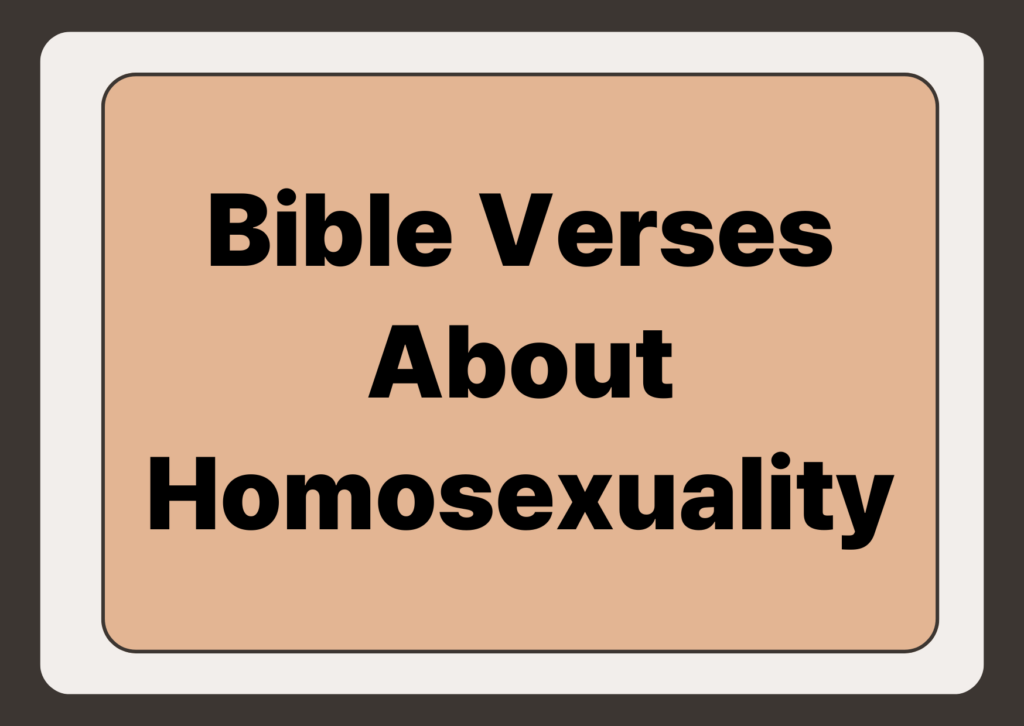
The topic of homosexuality is one that has been discussed within Christian communities for many years. The Bible contains several verses that mention same-sex relationships, and interpreting these verses can vary depending on one’s theological perspective. Understanding these passages is important, as they can provide insight into how to approach this topic from a biblical standpoint. Below are some key Bible verses about homosexuality, along with an explanation of their possible meanings.
1. Leviticus 18:22 (KJV)
“Thou shalt not lie with mankind, as with womankind: it is abomination.”
This verse is one of the most frequently referenced when discussing homosexuality in the Bible. It clearly prohibits same-sex relationships between men. However, this law is part of the Old Testament’s code given to the Israelites, and many interpret it in the historical context of the ancient world. Some modern scholars argue that cultural and historical contexts should be considered in interpreting these laws today.
2. Romans 1:26-27 (KJV)
“For this cause God gave them up unto vile affections: for even their women did change the natural use into that which is against nature:
And likewise also the men, leaving the natural use of the woman, burned in their lust one toward another; men with men working that which is unseemly, and receiving in themselves that recompence of their error which was meet.”
In this passage, Paul addresses the consequences of rejecting God’s truth and explains how people turned away from natural relationships. The verses suggest that same-sex behavior is a result of turning away from God’s created order. However, many theologians argue that these verses refer more broadly to idolatry and rejecting God, and not just to same-sex relationships.
3. 1 Corinthians 6:9-10 (KJV)
“Know ye not that the unrighteous shall not inherit the kingdom of God? Be not deceived: neither fornicators, nor idolaters, nor adulterers, nor effeminate, nor abusers of themselves with mankind,
Nor thieves, nor covetous, nor drunkards, nor revilers, nor extortioners, shall inherit the kingdom of God.”
This passage is often cited when discussing sin in the New Testament, listing various sinful behaviors, including “effeminate” and “abusers of themselves with mankind,” which many interpret as referring to homosexual acts. However, interpretations vary, and some modern scholars emphasize the importance of understanding the cultural context and the nuances of the original Greek language.
4. 1 Timothy 1:9-10 (KJV)
“Knowing this, that the law is not made for a righteous man, but for the lawless and disobedient, for the ungodly and for sinners, for unholy and profane, for murderers of fathers and murderers of mothers, for manslayers,
For whoremongers, for them that defile themselves with mankind, for menstealers, for liars, for perjured persons, and if there be any other thing that is contrary to sound doctrine.”
In this passage, Paul mentions people who engage in immoral behavior, including “defiling themselves with mankind,” which many interpret as a reference to homosexual acts. Like other passages, some scholars argue that this should be understood in light of the broader context of sinful behaviors in general, not just same-sex relations.
5. Jude 1:7 (KJV)
“Even as Sodom and Gomorrah, and the cities about them in like manner, giving themselves over to fornication, and going after strange flesh, are set forth for an example, suffering the vengeance of eternal fire.”
The cities of Sodom and Gomorrah are often cited in discussions about homosexuality due to their destruction, which is attributed to their sinfulness, including sexual immorality. Many interpret the reference to “strange flesh” in this verse as a condemnation of homosexual behavior. However, some scholars argue that the sin of Sodom was more complex, including violence and a lack of hospitality, rather than just homosexuality.
Understanding and Interpretation
The Bible contains several verses that mention homosexuality, but it’s important to approach these verses with careful study and consideration of their context. Some Christian communities interpret these verses as a clear prohibition against same-sex relationships, while others believe that cultural and historical contexts should influence our understanding of these passages.
In modern times, various Christian denominations and communities interpret these passages differently. While some take a more traditional view, others believe that the Bible’s teachings on sexuality should be examined in light of new understandings of human relationships and love.
Ultimately, Christians are called to love one another, regardless of differences on this topic. The Bible teaches us to show kindness, compassion, and grace to all, just as Christ has shown love to us.
Questions You May Want to Explore Alongside This
✔️ How does the Bible address relationships and love? View Answer
✔️ What does the Bible say about sexual morality and purity? View Answer
✔️ What are the different interpretations of Bible passages about homosexuality? View Answer
✔️ How can we approach sensitive topics like this with kindness and respect? View Answer
✔️ What is the role of cultural context in interpreting biblical teachings on sexuality? View Answer

With the BITBIBLE app, you can easily read your favorite Bible verses and prayer prompts right from your lock screen. It’s a free app that allows you to access spiritual content anytime, anywhere, without needing to open your phone. Enjoy daily inspiration and prayers at no cost!
